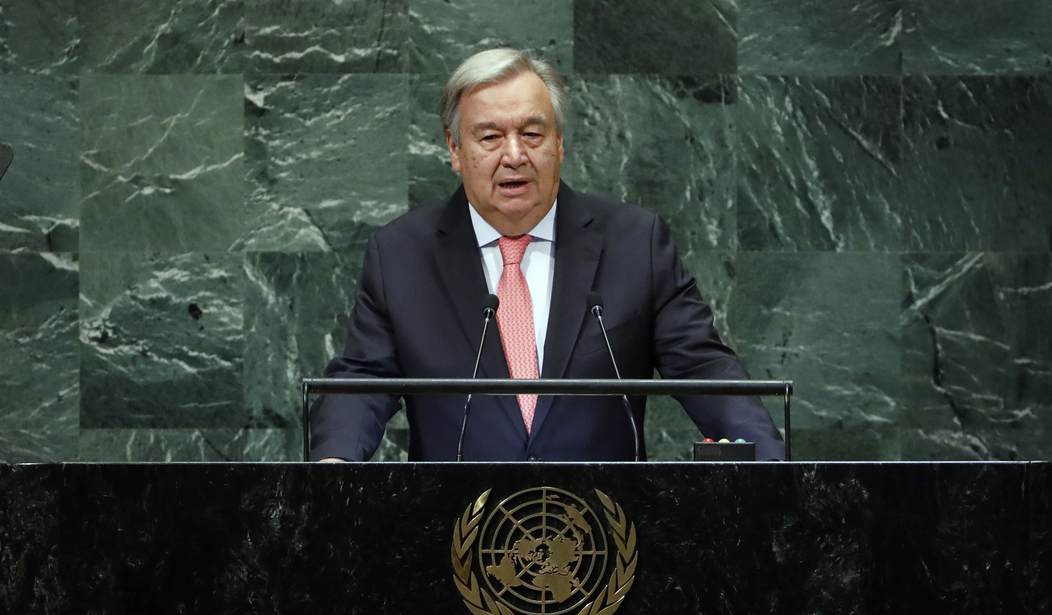The United Nations General Assembly on Sunday adopted the Pact for the Future, a “landmark agreement” among countries to work towards tackling the biggest challenges facing the world in the 21st century.
“We are here to bring multilateralism back from the brink,” said U.N. Secretary-General Antonio Guterres as he listed a number of challenges, including poverty, war, the climate “crisis,” artificial intelligence, and more.
“Our multilateral tools and institutions are unable to respond effectively to today’s political, economic, environmental and technological challenges,” he continued. “And tomorrow’s will be even more difficult and even more dangerous."
Guterres long-pushed for the summit and the pact, which covers themes including peace and security, global governance, sustainable development, climate change, digital cooperation, human rights, gender, youth and future generations. It lays out some 56 broad actions that countries pledged to achieve. [...]
Global crises have spotlighted the need for U.N. reform and overhauling international financial systems. These challenges include ongoing wars in Ukraine, Gaza, and Sudan; lagging climate change mitigation efforts; widespread national debt issues; and concerns over technology advancing without governance.
Russia's Deputy Foreign Affairs Minister Sergey Vershinin criticized the negotiations and adopting the pact.Russia failed in its bid to include an amendment - backed by North Korea, Syria, Nicaragua, Belarus and Iran - that would have spelled out that "the United Nations and its system shall not intervene in matters which are essentially within the domestic jurisdiction of any state." (Reuters)
The Pact aims to strengthen the multicultural system, putting the UN and its charter at the center.
Robert F. Kennedy Jr. and others have sounded the alarm about the Pact.
Recommended
"Due to their failure with the pandemic treaty, the UN has decided to move on this issue through the General Assembly giving the Secretary General the emergency powers they could not get for the WHO," Kennedy said. "The United Nations Pact for the Future is an unconstitutional attempt to pass a treaty that allows international organizations to violate the sovereignty of the United States of America by declaring a global state of emergency without our consent. It is not good for the U.S. and it is not good for the rest of the world. To express your concerns, call the United States Ambassador to the United Nations at (212) 415-4000. In an administration where I participate, you won't have to do this."
Due to their failure with the pandemic treaty, the UN has decided to move on this issue through the General Assembly giving the Secretary General the emergency powers they could not get for the WHO.
— Robert F. Kennedy Jr (@RobertKennedyJr) September 22, 2024
The United Nations Pact for the Future is an unconstitutional attempt to pass a…
The Heritage Foundation detailed concerns with the Pact earlier this month.
The Summit of the Future, where U.N. member states are expected to endorse the Pact for the Future, is an attempt by the Secretary-General to “reinvigorate global action” and “further develop the frameworks of multilateralism so they are fit for the future.” He should instead be calling for reassessment, retrenchment, and refocus. The international response to COVID-19, for example, was highly flawed; peacekeeping is in retreat; negotiations founder on divergent priorities; and human rights violators hold sway in the Human Rights Council and General Assembly. The Pact would bestow additional responsibilities on an organization that cannot handle its current remit instead of focusing on areas like humanitarian assistance where the U.N. can make unique and valuable contributions. The Pact for the Future will join a long list of U.N. declarations that have served as diplomatic and rhetorical cudgels with which to attack the United States. The prudent path for the U.S. would be not to support the Pact for the Future in the upcoming Summit.

























